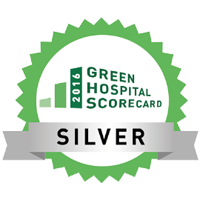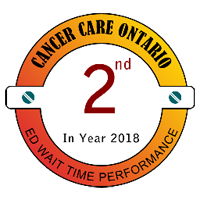Did you know?
You can send a greeting to a patient in the hospital by filling out this form with your message.
Don’t forget to include patient’s first name, last name, and the department they are staying in.
Welcome to Woodstock Hospital
Guidelines for Patients and Visitors
Coming to the hospital can be an overwhelming experience. We invite you to familiarize yourself with the following patient and visitor information.
Patients
- With the current measles activity in our region, we are urging patients to call ahead if they are confirmed to have measles, suspect they have measles, or have been in contact with someone with measles in the past 21 days. Click here to learn more.
- Click here to learn more about Woodstock Hospital’s Emergency Department.
- If you are coming to the hospital for an appointment, please bring your Ontario health card, a list of medications (including herbal), and proof of health insurance.
- We are a scent-free facility. Please refrain from wearing scented products.
- Bring toiletries if you are staying at the hospital. Do not bring jewelry, credit cards, large amounts of money, or electrical appliances (with exemption of electric razors).
- For your convenience we have free public Wi-Fi, a cafeteria that includes Tim Hortons, Food Services, Pharmasave, telephone and television services, Spiritual Services, and the newspaper/mail.
Visitors
- Please only visit patients if you are feeling well
- Please wash your hands or use the alcohol-based sanitizer when entering and exiting the hospital
- Woodstock Hospital is a mask-friendly organization and provides masks for visitors at all entrances
- Daily visiting hours are 11:00 am to 8:00 pm. Additional consideration may be given to critically ill, palliative, pediatric, long-stay, and labouring patients and other circumstances at the discretion of the clinical care team in consultation with the patient
- Limit of two (2) visitors per inpatient at a time
- L500 (Inpatient Mental Health) visiting hours are 2:30 pm to 4:30 pm and 6:00 pm to 8:00 pm
- Emergency, Day Surgery, and other Outpatients are permitted one (1) visitor to accompany them
- Children under 16 are not permitted to accompany a patient in Diagnostic Imaging or Chemotherapy. Children are also not permitted to visit Critical Care
- As of March 19th, 2025, Woodstock Hospital has implemented visitor changes for Maternal Child Women’s Health. This is in order to protect our most vulnerable patients from the increasing measles activity in the region. Click here to learn more.
- We are a scent-free environment. Please avoid using heavily scented products
- Don’t bring in latex balloons.
- We are a smoke-free environment. Anyone wishing to smoke must follow outdoor signage indicating where Woodstock Hospital’s property lines are
Alternate Level of Care and Co-Payment
Alternate Level of Care (ALC) is a term that is used in hospitals for inpatients who are occupying a bed but do not require the intensity of medical resources or services provided.
A patient is identified as ALC by the Physician when their health care needs improve to a point where they no longer require acute medical care but cannot go home. These patients are commonly waiting for a Long Term Care bed (LTC).
-
Co Payment Fees
- When the patient is designated as ALC waiting for a LTC bed they are required to pay a daily fee during their stay. This is called an ALC co-payment fee.
- The co-payment is the same amount that is charged for basic accommodation in a Long Term Care Facility.
- This fee is regulated and set by the Ministry of Health and Long Term Care and changes annually.
-
When does the ALC co- payment start?
The ALC co-payment starts on the date it is determined that the patient no longer needs the acute care services of a hospital and the clinical team has determined you will stay in hospital waiting for a Long Term Care Bed.
-
Are there any exemptions from co payment?
The following patients are exempt under the regulations from co-payment:
- Any patient under the age of 18 years of age.
- Any patient who, on the day before the patient was admitted to the hospital, was receiving income support under the Ontario Disability Support Program Act or income assistance under the Ontario Works Act
The following patients may be eligible to apply for a reduced co payment rate:
- Low income patients
- Patients with dependents
-
How to apply for an exemption?
You and/or your family is responsible for applying for an exemption if you feel you qualify. The hospitals Finance Department will provide you with:
- The Co-Payment Calculation
- The Application for Reduction of Assessed Co-Payment Fees
You will need to submit a copy of your last income tax return (T1 Tax Return Summary) and complete the application for reduction. If you do not complete, the hospital will assume that you are able to pay the maximum co payment rate.
-
Does OHIP cover the co payment?
- During your stay in our Hospital, OHIP will cover many the costs related to a patient’s acute medical care.
- Co Payment fees are NOT covered by OHIP
-
Does Private Health Insurance cover ALC Co Payment Fees?
- In some cases, private health insurance providers do cover the cost of ALC co payment fees. However, this is typically processed as a reimbursement.
- The patient is required to pay the co-payment fees upfront to the hospital then submits their receipts to claim their expense from their provider if applicable.
We encourage all patients to consult with their private health insurance providers for more information about their individuals’ policies.
For more information contact:
http://www.ontario.ca/page/hospital-chronic-care-co-payment
Repatriation Patient Information
-
What does repatriation mean?
It is the process of returning patients to their home hospital (closest to your home address). We will work with you to make the transition as smooth as possible.
-
Why do I have to be repatriated? Why can’t I stay at Woodstock Hospital?
We understand that the transfer of care from one hospital to another can be very stressful to patients and families. Repatriation ensures that we have open acute beds for patients in the community, and that we are delivering the right level of care to patients who need it the most at the right time.
-
Who coordinates repatriation at Woodstock Hospital?
The decisions to repatriate will be determined by the physician in charge of the patient’s care in consultation with the multi−disciplinary team, Patient Flow Manager or Hospital Coordinator. In the process of repatriation, there will be full team input in terms of recommendations for therapies and family supports, to ensure that optimal care goals are achieved.
-
How will I know when I am being repatriated?
The Charge Nurse and/or Patient Flow Manager or Hospital Coordinator will communicate with the patient or substitute decision maker (SDM) when the process for repatriation has been started and will provide updates accordingly surrounding potential or planned repatriation.
-
What is the process after I am placed on the repatriation list?
Sometimes it can take a little while to ensure all the pieces are in place before the patient is repatriated. This includes waiting for a bed to become available at the receiving hospital and ensuring the team there is ready for the patient. This process can sometimes happen quickly, and the patient may be notified that they are being repatriated on the same day.
-
How will I get to the other hospital?
Safe transportation to the hospital closer to the patient’s home will be arranged by Woodstock Hospital according to the patient’s medical needs, and level of care required. This may include ambulance or private transport providers.
-
Who do I talk to if I have more questions about repatriation?
Please speak with a member of the care team such as a Charge Nurse, Patient Flow Manager or Hospital Coordinator if there are further questions about the repatriation process.
Maternal Child Care
SHOULD I COME TO THE HOSPITAL?
– Do you have contractions that are 3-5 min apart that you can’t walk or talk through?
– Do you feel you need pain medication to cope with the pain of contractions?
– Are you leaking fluid?
– Are you not feeling your baby move or are you having less than 6 movements in 2 hours?
– Are you experiencing any bleeding?
– Are you feeling upper abdominal pain, persistent headache or visual problems?
– Do you have fever or chills?
– Are you under 36 weeks and experiencing any of the above symptoms OR:
– lower constant back pain
– Nausea, vomiting and/or diarrhea
– Pelvic pressure
If you answered ” YES ” to any of the above questions, you should be assessed at the hospital.
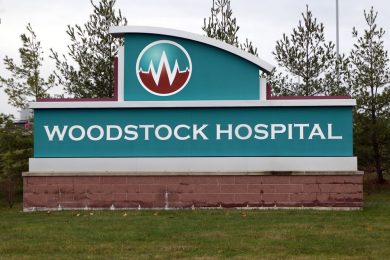
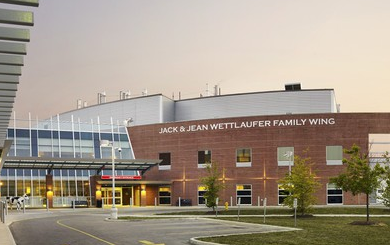
Our story
The original Woodstock General Hospital on Riddell and Wellington was opened in 1895, had one small operating room, and a capacity for only 30 patient beds. While expansion continued throughout the 1900’s, in the fall of 2008, construction broke ground at the new hospital site on Juliana Drive, opening its doors to the community in November of 2011.
More than twice the size of the old facility, the new three-storey hospital is 350,000 square feet, has the capacity for 178 patient beds, and proudly offers new services including Inpatient Rehabilitation, MRI technology, and Chemotherapy.

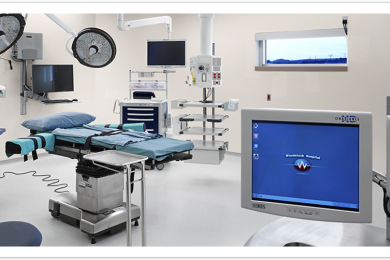
Technology
Since moving to the brand new hospital facility in 2011, Woodstock Hospital has continued to expand, advance, and innovate. The hospital is equipped with cutting-edge technology including a full Pneumatic Tube System to all clinical units in the building, as well as brand new nursing workstations and medication dispensing systems. The hospital offers Chemotherapy, as well as impressive Diagnostic Imaging services including MRI technology.
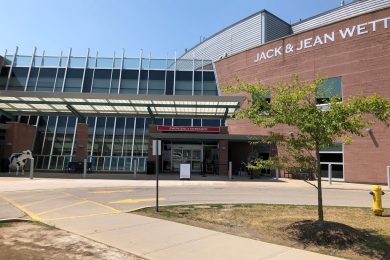
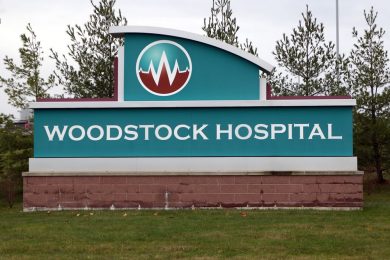
Environmental Sustainability
Environmental stewardship has been embedded into the design and operation of the new Woodstock Hospital. As well as bioswales to filter pollution out of rainwater runoff, the hospital has incorporated a rain garden and pollinator gardens into the landscape of the property. The hospital has also installed 340 roof-mounted and façade-mounted solar panels that make up for 50% of the power for the hospital’s Medical Professional Building.
As well as the 21 electric car charging stations and corresponding educational signage, in 2019, Woodstock Hospital installed a Combined Heat and Power Cogeneration (CHP) Plant. The process of the CHP Plant provides heat for the hospital while making up for 85% of its total electricity.
What Sets Us Apart
Woodstock Hospital has been awarded high honours such as Accreditation with Exemplary Standing by Accreditation Canada, silver level certification in Leadership in Energy and Environmental Design; has been recognized for its Emergency Department wait times and efforts in energy conservation and innovation; and has welcomed the addition of talented staff members, services, and cutting-edge technology.
-
Chemotherapy
Woodstock Hospital works with the London Regional Cancer Centre to provide systemic chemotherapy services closer to home for referred patients from Oxford County.
-
Mental Health
As a schedule 1 psychiatric facility, our Mental Health Department includes essential services that provide observation, care and treatment to all residents of Oxford County
-
Woodstock Rehabilitation Clinic
The Woodstock Rehabilitation Clinic is a fee for service clinic operated by Woodstock Hospital. This include ergonomics, concussion management and sports medicine.
-
Dialysis
Routine hemodialysis is conducted in the Woodstock Hospital Dialysis Unit, where treatment is initiated and managed by specialized nurses and technicians.
-
Emergency Department
Woodstock Hospital offers Emergency services 24 hours a day, 7 days a week. On average we care for over 46,000 people every year.
-
Surgical Services
Woodstock Hospital’s Surgical Services Department is comprised of a highly skilled staff who provide progressive surgical techniques with modern equipment



